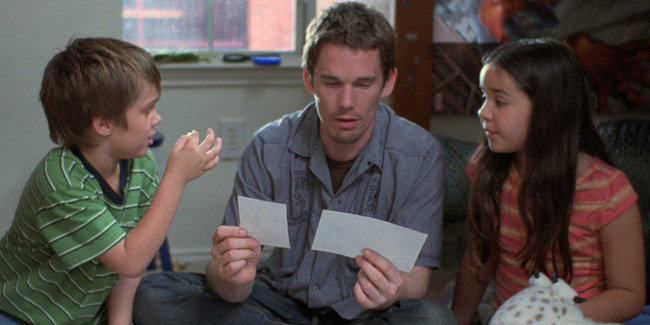Review: Boyhood
Directed by Richard Linklater • 2014 • 165 min
One of cinema’s defining features is its ability to capture duration. Unlike the photograph, giving us a snapshot of a single moment, film provides a record of the passing of time. We acknowledge this every time we look to the news for truth or watch a home movie nostalgically. Their perceived value comes from the documentary quality of freezing the unfolding of events. Richard Linklater has explored this facet of the cinema across his career, pushing it, testing its limits. In his feature debut Slacker, he used a quasi-real-time approach, allowing us to meander with his characters. With his Before series, he checked in, roughly every ten years, on a man and woman’s developing romance, seemingly meant to continue unfulfilled until the (perhaps) final installment, Before Midnight, in 2013.
In Boyhood, he is much more deliberate and direct in his attempt to tell the ongoing story of a young boy, Mason (Ellar Coltrane), coming of age. Linklater filmed Boyhood over twelve years, a few months at a time. The premise is simple: we watch Mason live through his boyhood, from ages six to eighteen. Every now and then, the film jumps forward elliptically, pointing to the passage of time as well as to the events that we’ve inevitably missed along the way. Film can only capture so much.
Boyhood‘s basic aim can be frustrating. It is very much a time capsule. One gets the sense that every time the cast and crew regrouped over the years, there was a mad shuffle to capture the spirit of the present moment. In certain instances this works quite well, as when Mason, his sister, and their friends line up to buy the new Harry Potter novel at midnight, a moment that is strongly evocative of childhood for a whole generation of viewers while also a clear snapshot of a specific historical moment. Or similarly when the film’s soundtrack situates us perfectly in time with the radio hits of the recent past. Too often though, it feels like we’re working through a Forrest Gump-style checklist of the major events of the last twelve years. It is an undeniable treat, however, to see Patricia Arquette and Ethan Hawke as Mason’s parents, delivering some of the best work of their careers. At times it feels like we’re watching a lost film from years ago, recovered to give these stars overdue credit.
Stories of young men coming of age are nothing new in American cinema, and Linklater adds very little to the genre. Boyhood’s most heinous crime is no doubt its betrayal of such a compelling contextual premise. With all of the anticipation and promise of such an experiment, the film disappoints with a by-the-book family drama. If anything, Linklater’s narrow focus detracts from some of the film’s most intriguing characters - he refuses to stray from Mason long enough to give us a proper glimpse of his sister, Samantha (Loreilei Linklater). And Patricia Arquette is by far Boyhood’s greatest strength, despite being equally secondary. Rarely do these narratives offer such a rich and nuanced perspective on motherhood, and Arquette is very much up to the task. A single parent, we watch as she seeks out an education and career, goes through failed relationships and abuse, supports her children as they grow up and leave home, and prepares for her life in the “empty nest.” She is no stereotype, no stock character, no prop for Mason’s development. She provides a complex and compelling centre to this otherwise bland family saga, and a refreshing take on motherhood.
For a twelve-year project, interrupted by numerous other films, Boyhood is remarkably coherent, both stylistically and narratively. The years between shoots bleed into each other seamlessly, leaving us with a consistent end product. What’s more, the years unfold before us naturally. At 165 minutes, the film has room to breath, and, despite covering such an immense block of time, it does a great job of managing its subject matter. For all its faults, Boyhood is a successful experiment with cinematic time.
